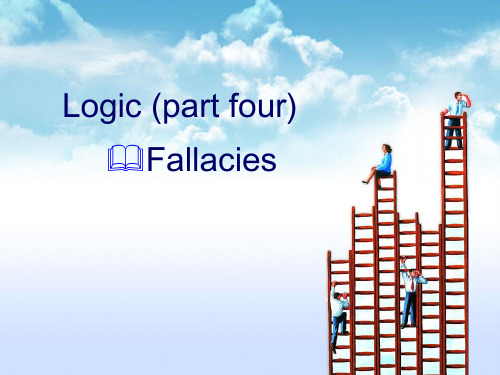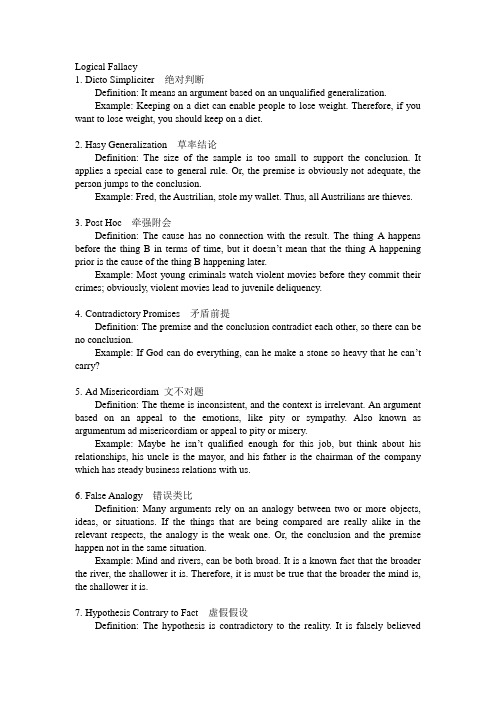Logical Fallacy
- 格式:doc
- 大小:32.00 KB
- 文档页数:3






Logical Fallacy1.Dicto Simpliciter 绝对判断Definition: It means an argument based on an unqualified generalization.Example: Keeping on a diet can enable people to lose weight. Therefore, if you want to lose weight, you should keep on a diet.2.Hasy Generalization 草率结论Definition: The size of the sample is too small to support the conclusion. It applies a special case to general rule. Or, the premise is obviously not adequate, the person jumps to the conclusion.Example: Fred, the Austrilian, stole my wallet. Thus, all Austrilians are thieves.3.Post Hoc 牵强附会Definition: The cause has no connection with the result. The thing A happens before the thing B in terms of time, but it doesn’t mean that the thing A happening prior is the cause of the thing B happening later.Example: Most young criminals watch violent movies before they commit their crimes; obviously, violent movies lead to juvenile deliquency.4.Contradictory Promises 矛盾前提Definition: The premise and the conclusion contradict each other, so there can be no conclusion.Example: If God can do everything, can he make a stone so heavy that he can’t carry?5.Ad Misericordiam 文不对题Definition: The theme is inconsistent, and the context is irrelevant. An argument based on an appeal to the emotions, like pity or sympathy. Also known as argumentum ad misericordiam or appeal to pity or misery.Example: Maybe he isn’t qualified enough for this job, but think about his relationships, his uncle is the mayor, and his father is the chairman of the company which has steady business relations with us.6.False Analogy 错误类比Definition: Many arguments rely on an analogy between two or more objects, ideas, or situations. If the things that are being compared are really alike in the relevant respects, the analogy is the weak one. Or, the conclusion and the premise happen not in the same situation.Example: Mind and rivers, can be both broad. It is a known fact that the broader the river, the shallower it is. Therefore, it is must be true that the broader the mind is, the shallower it is.7.Hypothesis Contrary to Fact 虚假假设Definition: The hypothesis is contradictory to the reality. It is falsely believedthat there is only one possibility to the state of affairs.Example: If the gunpowder hadn’t been invented, there wouldn’t have been so many wars in the worlds.8.Poisoning the Well 井下投毒Definition: Or speaking “against the man”. The premises may only make a personal attack on the person, instead of offering reasons to show why what he says is false. It is a special case of argumentum ad hominem(人身攻击).Example: The defendant killed the victim cruelly, I suggest Lord sentence him to guilty.。
●Dicto Simpliciter 绝对判断(Latin: "from a maxim without qualification", meaning "from a universal rule") or ad dictum simpliciter (Latin: "to a maxim without qualification", meaning "to a
(meaning "from") is often omitted when this phrase is used in
hoc ergo propter hoc, in which the chronological ordering of a correlation is insignificant.
●Contradictory Premises矛盾前提Conclusions are drawn from the interactions of premises: where two premises contradict each other, there can be no interaction and hence no conclusion. Similarly, if the definitions of two terms conflict with or exclude each other, then those two terms cannot be simultaneously ascribed to a single object or event.
●Ad Misericordiam文不对题is a fallacy in which someone tries to win support for an argument or idea by exploiting her or his opponent's feelings of pity or guilt. The appeal to pity is a specific kind of appeal to emotion.
●False Analogy错误类比is an informal fallacy applying to inductive arguments. It is often mistakenly considered to be a formal fallacy, but it is not, because a false analogy consists of an error in the substance of an argument (the content of the analogy itself), not an error in the logical structure of the argument.
●Hypothesis Contrary to Fact 与事实相反的假设This fallacy consists in treating a hypothetical claim as if it were a statement of fact by making a claim, without sufficient evidence, about what would have
happened in the past if other conditions had been present or an event that will occur in the future.
●Poisoning the Well井下放毒(or attempting to poison the well) is a logical fallacy where adverse information about a target is pre-emptively presented to an audience, with the intention of discrediting or ridiculing everything that the target person is about to say.。